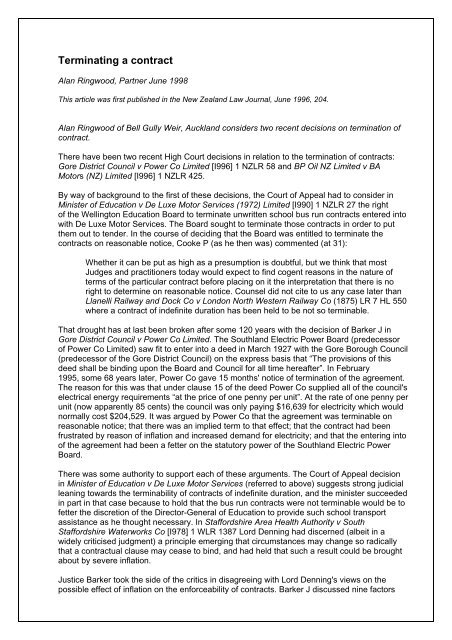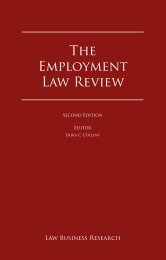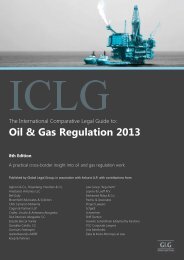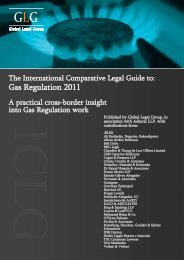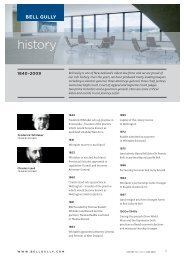CONTRACT LAW T Terminating a contract - Bell Gully
CONTRACT LAW T Terminating a contract - Bell Gully
CONTRACT LAW T Terminating a contract - Bell Gully
You also want an ePaper? Increase the reach of your titles
YUMPU automatically turns print PDFs into web optimized ePapers that Google loves.
<strong>Terminating</strong> a <strong>contract</strong><br />
Alan Ringwood, Partner June 1998<br />
This article was first published in the New Zealand Law Journal, June 1996, 204.<br />
Alan Ringwood of <strong>Bell</strong> <strong>Gully</strong> Weir, Auckland considers two recent decisions on termination of<br />
<strong>contract</strong>.<br />
There have been two recent High Court decisions in relation to the termination of <strong>contract</strong>s:<br />
Gore District Council v Power Co Limited [I996] 1 NZLR 58 and BP Oil NZ Limited v BA<br />
Motors (NZ) Limited [I996] 1 NZLR 425.<br />
By way of background to the first of these decisions, the Court of Appeal had to consider in<br />
Minister of Education v De Luxe Motor Services (1972) Limited [I990] 1 NZLR 27 the right<br />
of the Wellington Education Board to terminate unwritten school bus run <strong>contract</strong>s entered into<br />
with De Luxe Motor Services. The Board sought to terminate those <strong>contract</strong>s in order to put<br />
them out to tender. In the course of deciding that the Board was entitled to terminate the<br />
<strong>contract</strong>s on reasonable notice, Cooke P (as he then was) commented (at 31):<br />
Whether it can be put as high as a presumption is doubtful, but we think that most<br />
Judges and practitioners today would expect to find cogent reasons in the nature of<br />
terms of the particular <strong>contract</strong> before placing on it the interpretation that there is no<br />
right to determine on reasonable notice. Counsel did not cite to us any case later than<br />
Llanelli Railway and Dock Co v London North Western Railway Co (1875) LR 7 HL 550<br />
where a <strong>contract</strong> of indefinite duration has been held to be not so terminable.<br />
That drought has at last been broken after some 120 years with the decision of Barker J in<br />
Gore District Council v Power Co Limited. The Southland Electric Power Board (predecessor<br />
of Power Co Limited) saw fit to enter into a deed in March 1927 with the Gore Borough Council<br />
(predecessor of the Gore District Council) on the express basis that “The provisions of this<br />
deed shall be binding upon the Board and Council for all time hereafter”. In February<br />
1995, some 68 years later, Power Co gave 15 months' notice of termination of the agreement.<br />
The reason for this was that under clause 15 of the deed Power Co supplied all of the council's<br />
electrical energy requirements “at the price of one penny per unit”. At the rate of one penny per<br />
unit (now apparently 85 cents) the council was only paying $16,639 for electricity which would<br />
normally cost $204,529. It was argued by Power Co that the agreement was terminable on<br />
reasonable notice; that there was an implied term to that effect; that the <strong>contract</strong> had been<br />
frustrated by reason of inflation and increased demand for electricity; and that the entering into<br />
of the agreement had been a fetter on the statutory power of the Southland Electric Power<br />
Board.<br />
There was some authority to support each of these arguments. The Court of Appeal decision<br />
in Minister of Education v De Luxe Motor Services (referred to above) suggests strong judicial<br />
leaning towards the terminability of <strong>contract</strong>s of indefinite duration, and the minister succeeded<br />
in part in that case because to hold that the bus run <strong>contract</strong>s were not terminable would be to<br />
fetter the discretion of the Director-General of Education to provide such school transport<br />
assistance as he thought necessary. In Staffordshire Area Health Authority v South<br />
Staffordshire Waterworks Co [I978] 1 WLR 1387 Lord Denning had discerned (albeit in a<br />
widely criticised judgment) a principle emerging that circumstances may change so radically<br />
that a <strong>contract</strong>ual clause may cease to bind, and had held that such a result could be brought<br />
about by severe inflation.<br />
Justice Barker took the side of the critics in disagreeing with Lord Denning's views on the<br />
possible effect of inflation on the enforceability of <strong>contract</strong>s. Barker J discussed nine factors
which pointed to the agreement being intended to be perpetual, including the respective<br />
bargaining powers of the parties and the benefits and burdens of the <strong>contract</strong>. It might however<br />
have been sufficient for the learned judge to have finished his deliberations with his first factor,<br />
which was (at 69):<br />
The words of the agreement are clear. It is difficult to imagine a clearer way a drafter<br />
could impose a permanent obligation than to say “the provisions of this Deed shall be<br />
binding on [the parties] for all time hereafter”. Had the parties wished to make the<br />
agreement determinable on reasonable notice, it is safe to assume that they would<br />
have done so.<br />
Thus His Honour was able (at 70) to<br />
uphold the plain meaning of the 1927 agreement. To imply a term to the contrary would<br />
be not only to rewrite the <strong>contract</strong>, but also to disturb the likely intentions of the<br />
parties.<br />
It is refreshing to read a judgment which upholds rather than subverts agreed <strong>contract</strong>ual<br />
terms (particularly in a “hard case”). The decision is also interesting as an example of two<br />
Southern bodies availing themselves of the jurisdiction of the Commercial List in Auckland<br />
under s24C(4) of the Judicature Act to determine the disputed construction of a <strong>contract</strong>.<br />
In the second recent decision, BP Oil NZ Limited v BA Motors (NZ) Limited, the Court had to<br />
consider the termination provisions of a written supply agreement whereby BA Motors<br />
agreed to purchase petroleum products from BP for “the term specified in the First Schedule to<br />
the agreement”, which was “From: 1 st December 1988; To: 30th November 1993”. There was a<br />
termination clause which provided: “The Buyer shall be required to give the Seller 12 months<br />
notice in writing of its intention to terminate this Agreement on or after the due expiry date<br />
specified in the First Schedule”.<br />
As the expiry date of the agreement approached the parties discussed future arrangements<br />
but 30 November came and went without a new agreement and without any notice being<br />
given under the termination clause. The Court had to decide two issues. The first was simply a<br />
factual issue of whether an oral agreement had been reached to continue supply on a month<br />
by month basis (it was held that no such agreement had been reached). The second was what<br />
(if any) notice BA Motors was required to give to BP, when notice could be given, and whether<br />
it had been given.<br />
BP argued that there were two possible interpretations of the termination clause: termination<br />
had to be on or after the due expiry date; or notice had to be given on or after the expiry date.<br />
In either case it was argued that 12 months’ notice had to be given and that the <strong>contract</strong><br />
continued to remain in force until cancelled by BA Motors in accordance with the termination<br />
clause. BA Motors argued that the agreement, taken as a whole, was a fixed-term agreement,<br />
and pointed to external evidence as to how the parties conducted themselves in support of<br />
the fixed-term premise.<br />
Justice Hammond noted that the two commercial parties had chosen to reduce their<br />
negotiations to writing and that the <strong>contract</strong> had its own meaning. He declined to go outside<br />
the terms of the <strong>contract</strong> in interpreting it. He found however that the termination clause had<br />
two plausible meanings. It could, taken at face value, support BP’s argument that notice<br />
could be given at any time, even after the expiry of the five year tern: or, in the context of the<br />
agreement as a whole, it could require notice to be given during the five year term, such that<br />
the maximum term of the agreement (if notice were given on the last day of the original five<br />
years, to expire one year later) was to November 1994.<br />
2
The difficulty of this dichotomy of plausible meanings was resolved in the following way (at<br />
430):<br />
Once there are two reasonably plausible meanings for the clause (as I think there are<br />
in this case) then the one which is less favourable to the party who supplied the<br />
language is to be preferred. This contra proferentem (“against the profferer”) principle is<br />
much resorted to by Courts in disputes relating to standard-form <strong>contract</strong>s. And it has<br />
been particularly useful in relation to unequal bargaining situations (such as Draconian<br />
exemption clauses in consumer <strong>contract</strong>s). But I know of no authority, I see no reason<br />
in principle, why it should not apply even between parties with equal bargaining<br />
strengths. I appreciate that at the end of the day, contra proferentem is really a rule of<br />
resolution, as opposed to something which can properly be said to be an intrinsic test<br />
assisting in the ascertaining of the meaning of something. Thus the benefit of the rule is<br />
functional rather than intrinsic; it is a tiebreaker, and penalises the careless drafter of<br />
documents. But the present case is a good illustration of the utility of the principle. In<br />
the result, on the application of this principle, I prefer the second interpretation.<br />
BA Motors had eventually given notice in October 1994. Depending on the construction of the<br />
termination clause, the <strong>contract</strong> either ran until October 1995, or could not extend beyond<br />
November 1994. By the application of the contra proferentem rule the <strong>contract</strong> was construed<br />
against BP, and it was held that the <strong>contract</strong> could not run beyond November 1994. BP's loss<br />
of profits claim was therefore restricted to the period October-November 1994. Questions of<br />
the quantum of any damages were deferred to a further hearing.<br />
The contra proferentem rule can be viewed as a risk allocation mechanism, requiring the party<br />
responsible for a <strong>contract</strong>ual ambiguity to accept the least favourable construction. It should<br />
only be resorted to when other rules of construction fail. In this case the Court found two<br />
plausible constructions, thereby opening the way for the application of the rule to break<br />
the deadlock. The judgment however gives the distinct impression that the other usual rules of<br />
construction could have given the same result. Justice Hammond identified several objections<br />
to reading the clause at face value, but noted that the clause made sense when taken in the<br />
context of the agreement as a whole. The same result could therefore have been achieved<br />
simply by preferring the latter construction. The use of the contra proferentem rule to break a<br />
tie between parties of equal bargaining strength is also not as novel as the judgment suggests.<br />
While most often encountered in the context of exclusion clauses, the rule of construction<br />
against the grantor is a rule of general application in cases of ambiguity, when other rules of<br />
construction fail, irrespective of the bargaining strengths of the parties. See for example Chitty<br />
on Contracts, paras 12-071, the cases there cited, and the quotation from Coke:<br />
It is a maxim in law that every man's grant shall be taken by construction of law most<br />
forcibly against himself.<br />
As Justice Hammond correctly noted the decision is nonetheless a useful reminder of the utility<br />
of the contra proferentem rule as a potential tiebreaker when other rules of construction<br />
fail.<br />
3


